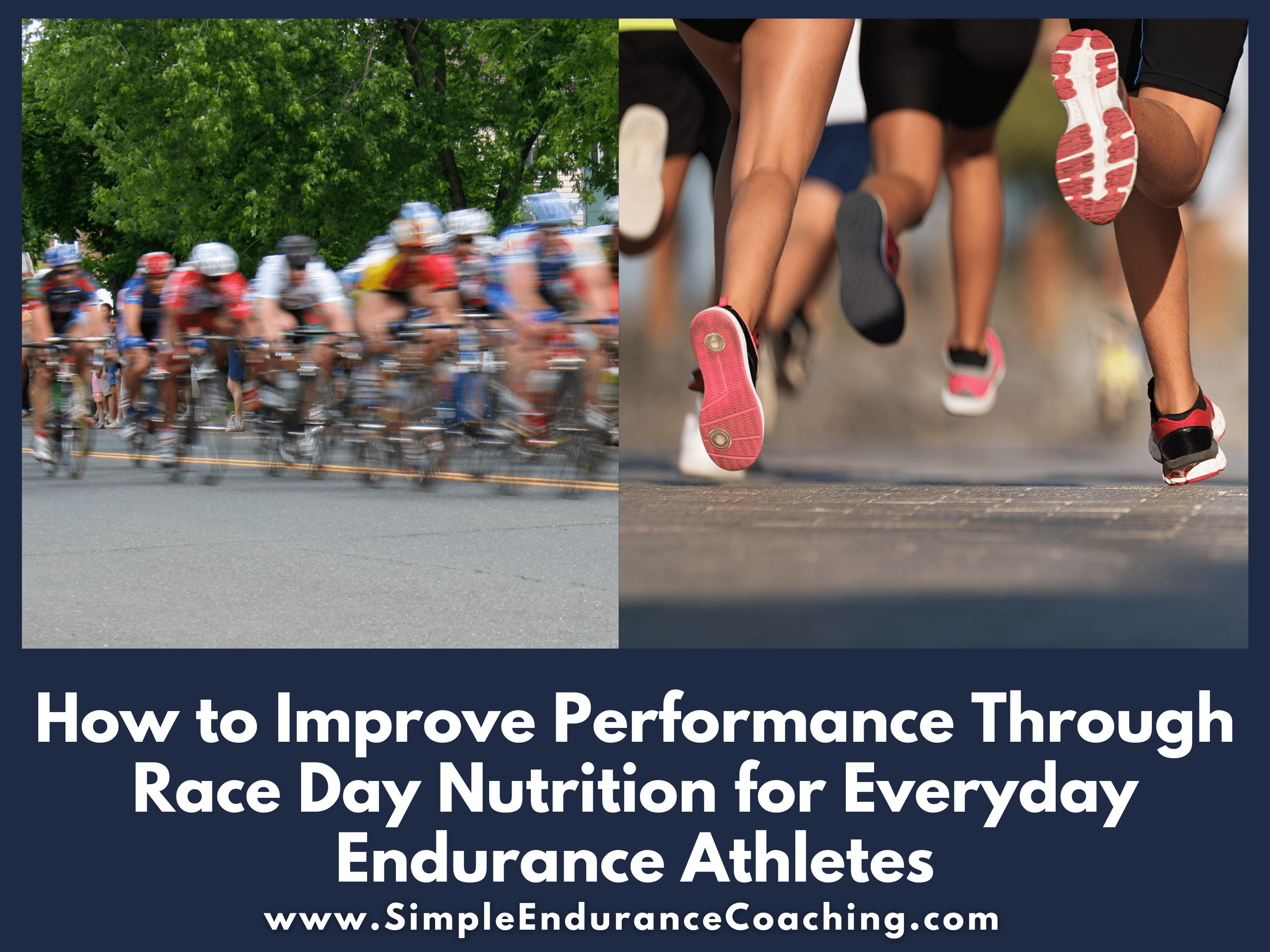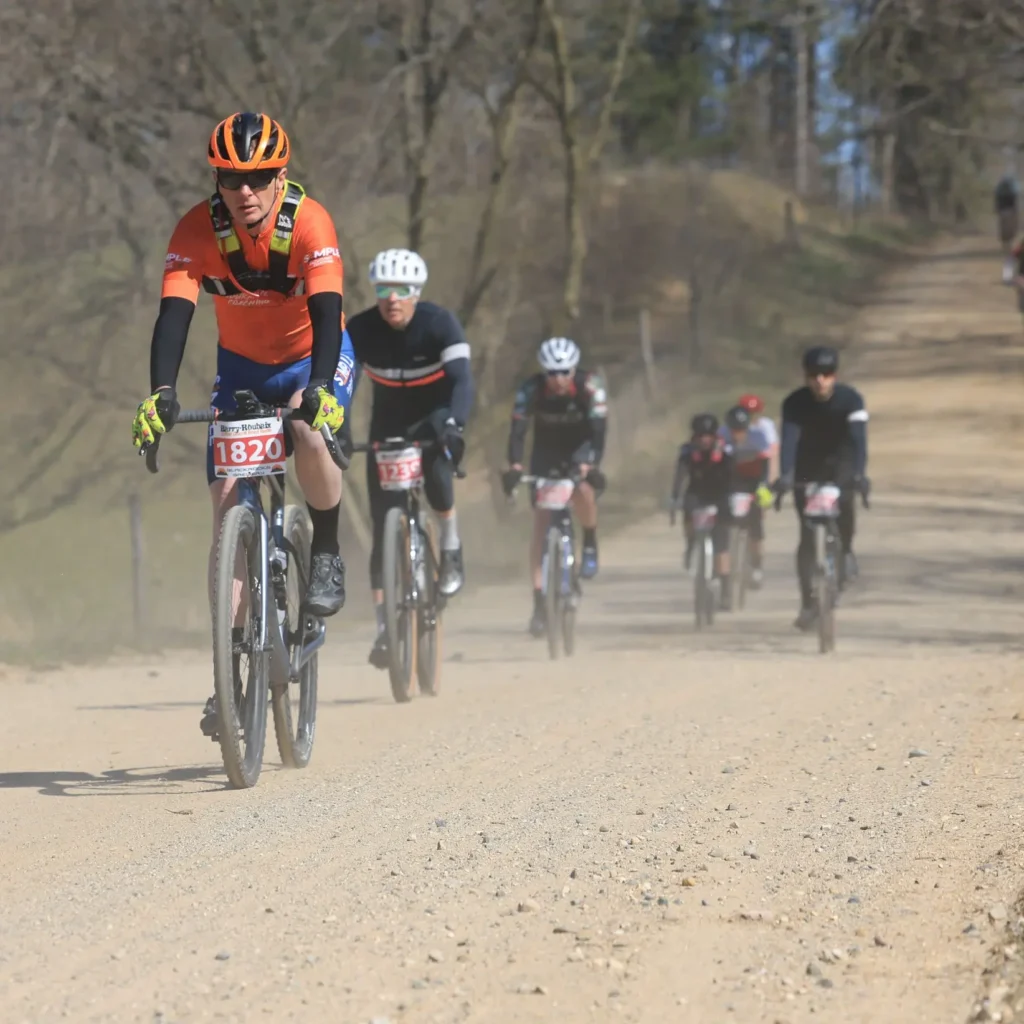For endurance athletes like cyclists, runners, and triathletes, nutrition plays a pivotal role in achieving peak performance.
The right nutrition strategy can make all the difference on race day.
We’ll break down what the research suggests about nutrition the day before and the day of your event, and make specific suggestions for what to eat and drink, including my race-day breakfast recipe.

Review suggests periodizing nutrition
Three of the leading authorities on nutrition, Louise Burke, Asker Juekendrop, and Andrew Jones wrote a review that outlined various strategies to periodize nutrition to optimize race events.
That means changing your nutrition to meet your individual training needs.
“For example, workouts/phases targeting an enhancement of oxidative capacity should exploit the superior adaptations in fat metabolism and mitochondrial biogenesis following exercise with low CHO availability either at a whole-body level or muscle level (Burke et al., 2018c; Jeukendrup, 2017a). Conversely, quality/high-intensity training should be performed with high CHO availability, as it is during the races (Jeukendrup, 2017a).”
In other words, on low-intensity training days, focus on a low-carbohydrate diet to promote fat-burning.
And during high-intensity or race days, focus on getting enough carbohydrates to fuel your workout.
Here’s what the review suggests
For events lasting about 20 to 60 minutes:
- Eat a normal dinner the night before with a good supply of carbohydrates and a balance of good fats and protein. This will normalize your blood and muscle glycogen supplies. Focus on getting 7 to 12g/kg of carbohydrates.
- Eat a familiar pre-race meal that is mostly carbohydrates with minimal fats and protein to reduce the chances of gut discomfort. Pre-race caffeine is a good idea.
- There isn’t much need for fueling during the race. Your stored carbohydrates will supply your energy needs. Consider a gel mid-race, especially if it contains caffeine.
- Caffeine supplementation during the race could be 3-6g/kg.
- All meals and supplements should be practiced and tolerated before an event.
For events lasting more than an hour:
- It’s good practice to do some carbohydrate loading the day before to store as much carbohydrate as possible. The study suggests a low-fiber diet with white rice, potatoes, or pasta as carb sources. A low-fiber diet also encourages cooked and pulp-free fruits and vegetables.
- Eat a familiar pre-race meal several hours before the event that includes carbohydrates, as well as minimal fats and protein.
- Consume carbs after warmup.
- Consume carbs roughly every 30 minutes to get 30 to 60g/hour.
- Hydrate according to thirst, in small amounts, and at opportune moments.
- Caffeine supplementation during the race could be 3-6g/kg.
- All meals and supplements should be practiced and tolerated before an event.
In addition, other sources show that races longer than two hours may benefit from up to 90g/kg/hour.
Let’s get into what this all means!
Nutrition and hydration before the race
Carbohydrate loading is a tried-and-true strategy to maximize glycogen stores in your muscles, providing the energy needed for endurance events.
The day before your race, aim to consume a higher percentage of carbohydrates, around 60-70% of your total intake.
Great sources of carbs include pasta, rice, potatoes, and whole grains.
Include moderate amounts of protein from sources like lean meats, beans, and dairy.
Healthy fats from avocados, nuts, seeds, and olive oil are also important but keep them in balance with your overall intake.
Staying hydrated is essential for optimal performance.
Drink water and electrolyte-rich fluids consistently throughout the day before your race.
Avoid alcohol and excessive caffeine, as they can lead to dehydration.
Avoid new foods
Stick to familiar foods that you know agree with your stomach.
Trying new foods the day before a race can lead to gastrointestinal issues, which is the last thing you need on race day.
Use your training days to try new foods and drinks to make sure your stomach can tolerate them.
Food for race day
Breakfast
Your race-day breakfast should be high in carbohydrates, moderate in protein, and low in fat and fiber to prevent any digestive discomfort.
Eat this meal 3-4 hours before the race.
Great options include oatmeal with fruit, toast with nut butter, or a smoothie with yogurt and berries.
This meal will top off your glycogen stores and keep you fueled.
My favorite go-to for race-day breakfast is oatmeal mixed with liquid egg whites.
Once the oatmeal has cooked, I add some butter (for fat), berries, and milk.
Pre-race snack
If you need a snack closer to race time, opt for something small and easily digestible 30-60 minutes before the start.
A banana, some blocs, or a gel can provide a quick energy boost without causing discomfort.
After your warmup is a good time to get this in.
During the Race
Aim to drink 400-800 ml of water or sports drink with electrolytes per hour, depending on the conditions and your sweat rate.
For races lasting more than an hour, consume 30-60 grams of carbohydrates per hour, which might include gels, maple syrup, blocks, or other tolerated sources of carbohydrate.
Post-race nutrition and hydration
After crossing the finish line, start your recovery process within 30-60 minutes by refueling with a mix of carbohydrates and protein.
This combination helps replenish glycogen stores and repairs muscle tissue.
Examples of good recovery snacks include chocolate milk, a recovery smoothie, or a balanced meal with protein, carbs, and vegetables.
Continue to hydrate after the race with water and electrolyte drinks to replace lost fluids. Proper hydration aids recovery and prepares you for your next training session or race.
Stick with what works for you
Nutrition is a critical component of any endurance athlete’s race-day strategy.
By planning and preparing your nutrition well in advance, you can enhance your performance and recovery.
Stick to tried-and-true methods, avoid new foods before the race, and stay hydrated to give yourself the best chance of success.
Three things for everyday endurance athletes to know about race-day nutrition:
- Stick to familiar foods: Avoid new foods before the race to prevent gastrointestinal issues.
- Practice: Test all meals and supplements during training to ensure they work for you.
- Plan ahead: Proper planning and preparation of your nutrition can enhance your performance and recovery.
Need more?
Unlock the secrets to mastering gravel racing with our FREE Guide to Gravel Racing! Get yours here.
BOOK A CALL so we can discuss your goals, answer questions, and talk about making your endurance training more effective, fun, and Simple.
Paul Warloski is a:
- USA Cycling Level 1 Advanced Certified Coach
- RRCA Running Coach
- Training Peaks Level 2 Coach
- RYT-200 Yoga Instructor
- Certified Personal Trainer
- Certified Nutrition Advisor




